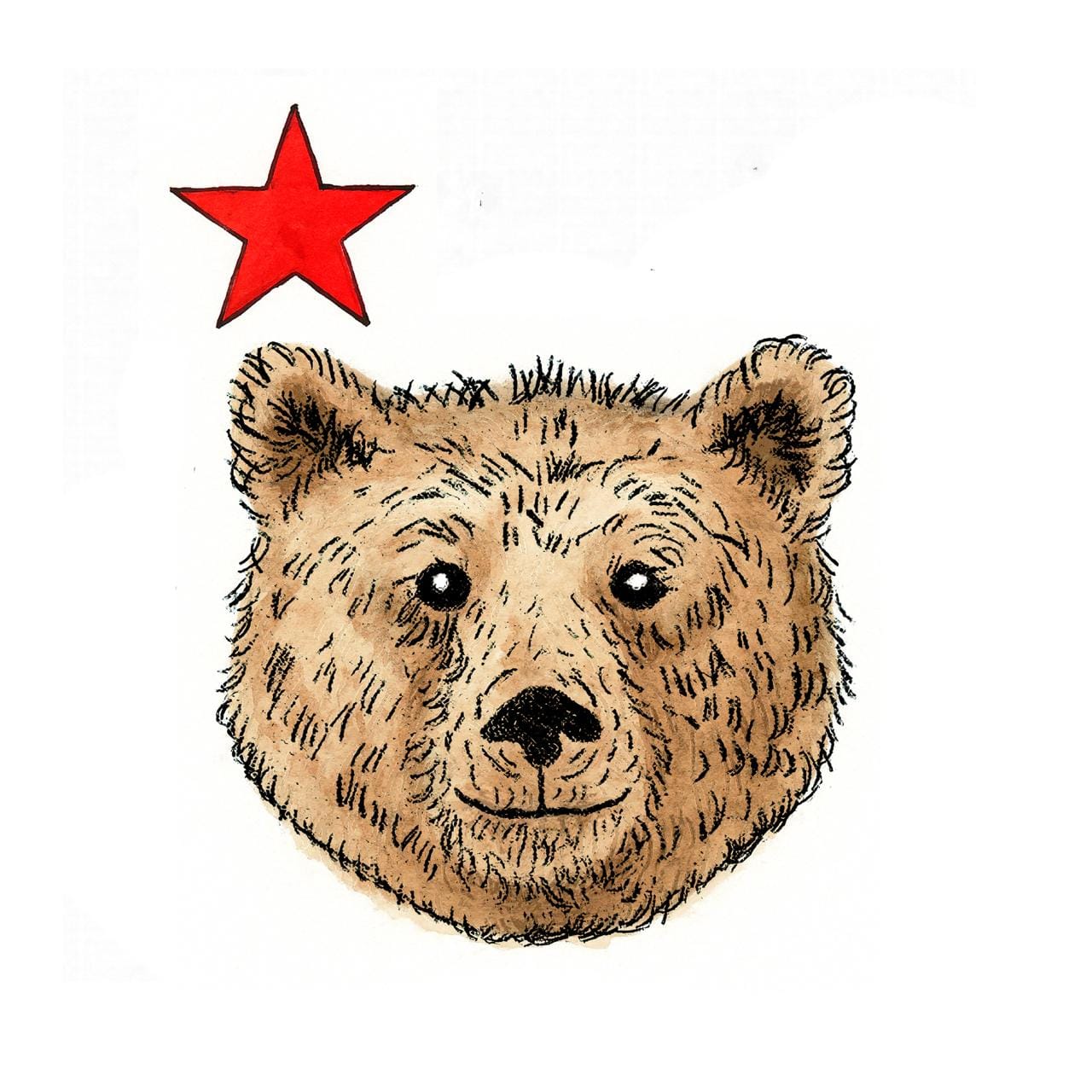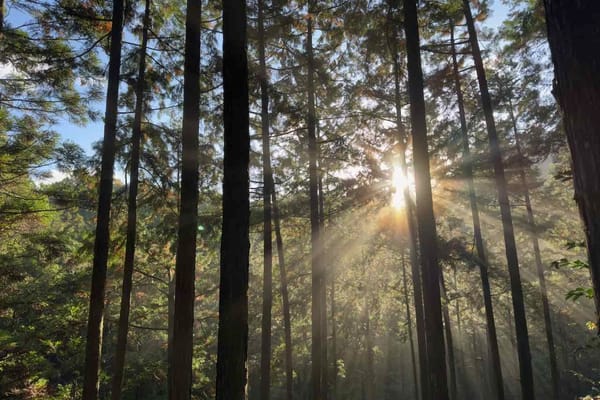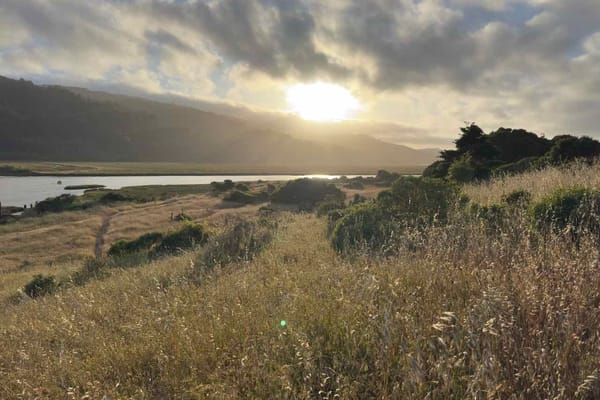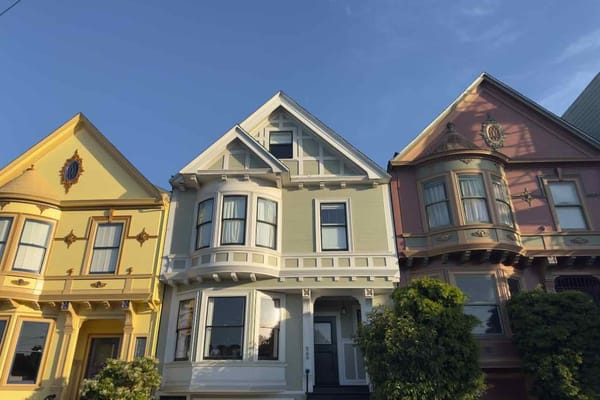The Blurring
What I live with isn't forgetting, it's the blurring. A meditation on grief, memory, and continuing without answers three years after loss.
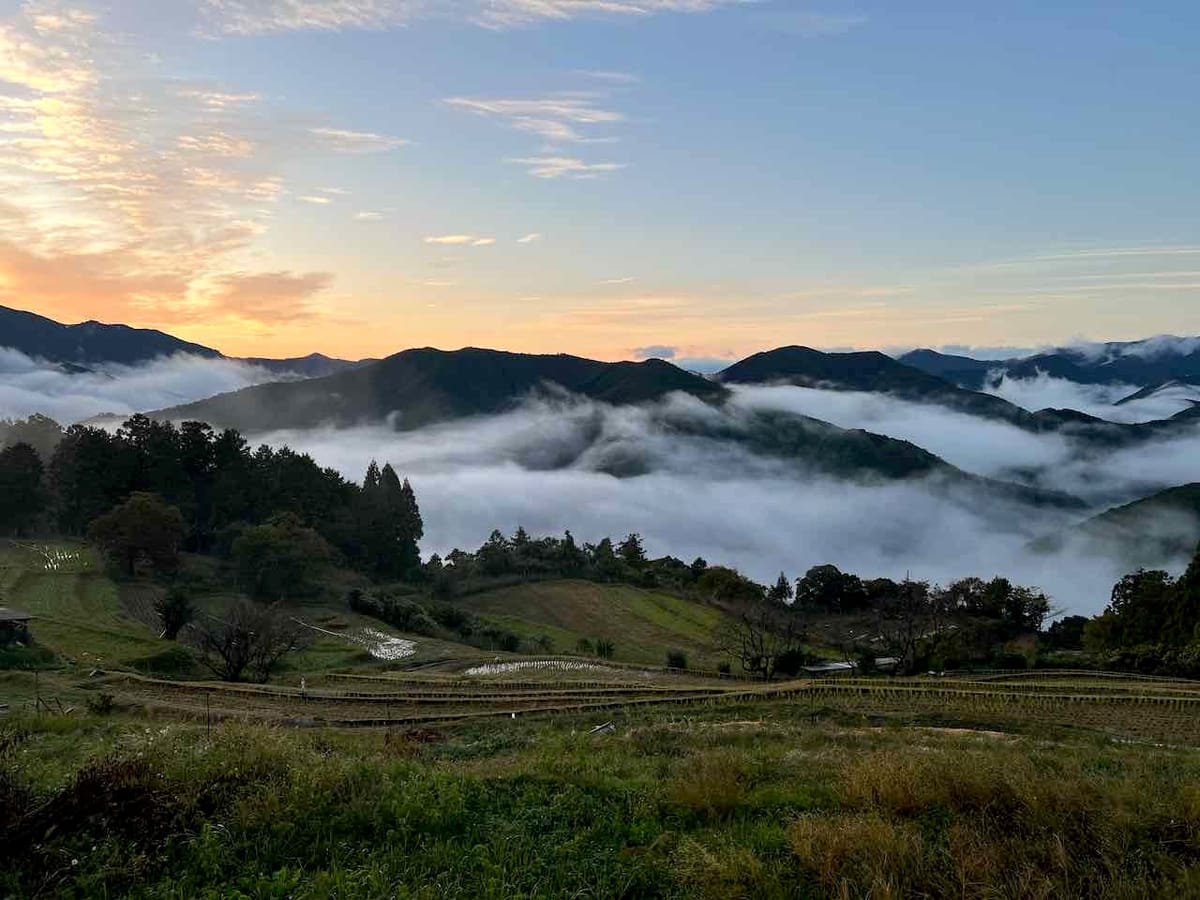
Before
I never used an alarm. At 7:15 he stirred, always the same side, always the same rhythm of breath. Some mornings I'd wake to rain hitting the bedroom window, one of my favorite sounds. At 7:30 the shower started, and the bedroom would heat up slightly with the steam. I could hear him humming through the pipes, a low sound that meant he was half awake. Then the sound of him sitting on the edge of the bed to put on his socks. Always the left first. If I was still asleep by the time the sock drawer slid open, I knew I was late.
He followed the same schedule every day. Sometimes we'd argue because I wanted to sleep in on the weekends, but he always got up at the same time. We compromised that he'd get back into bed and hold me until I woke up. I remember feeling his wet hair against me.
That was my clock, my music, my sense of time.
After
He died alone in our house in the middle of the day three years ago. I was in my office on a Zoom call about quarterly planning. The kinds of conversations that feel important until they're not. It was getting late, past our usual lunch time, so I muted myself and walked to the kitchen to ask what he wanted to eat.
He was on the floor.
I called 911. The paramedics came. I heard them work on him in the kitchen and then stop. I wasn't allowed to be in there while they worked. I waited in my office. A paramedic came to tell me what I already knew. I fell to my knees and screamed through the floor.
The hardest part wasn't that moment. It wasn't being given five minutes to say goodbye to him before they bagged his body, police officers standing guard while my dogs barked like crazy because there were so many strangers in the house. It wasn't seeing his body carried out in a bag, the last time he'd be in the home we shared for years.
It was that nothing was going to change. He would stay dead.
I collapsed. I couldn't stop screaming like an animal. I rocked back and forth. I poured water on myself.
I don't know his last words. I don't know if he called for help. I don't know if he was in pain. I don't know if he felt loved. I have no idea. I never will.
That night, I dreamed of an airplane. He was inside, looking out at me through the window. His face was so sad, but I couldn't hear a word he was saying. The plane began to move, rolling away from me.
The Aftermath
My body stayed collapsed. I couldn't keep food down. I couldn't sleep. I walked all night through the dark, and it never occurred to me to look before crossing the street. At the gym, I could barely lift a five-pound weight. I couldn't concentrate for more than seconds at a time.
I kept waking up in the night wondering why the bed was empty. The minutes I found sleep would collapse because everything felt wrong. The pain of comfort would cause everything to return. I'd start to settle into rest and the settling itself would wake me. Something's missing, something's wrong. Then I'd remember. Again.
There was a distance between learning someone is dead and knowing what that means. The first person I wanted to talk to about what was happening to me was my husband. Every conversation used to start with him, every road intersect with him. Every impulse, every instinct, was a fresh realization that he was dead. Every action was a fresh death.
I'd reach for my phone to text him something I'd seen. Remember mid-reach. I'd hear a song and think "he'd love this" before remembering he'd never hear anything again. Walking past his favorite coffee shop, I'd think "I should bring him something" and then the truth would land again, new and complete.
Every moment brought a fraction of a second of relief before the pain returned. It was a literally crazed anti-belief. My mind couldn't hold the fact. It kept resetting, kept forgetting, kept turning to him as if he were still the center of gravity around which everything else moved. Each time I remembered felt like the first time. Each time I had to learn it again.
I started doing all of it immediately. Having the tasks to complete gave me a momentary distraction. Every account set to autopay was suddenly about to lapse. Every login belonged to him, not to me. I became a detective in my own life, rifling through drawers and files, toggling between frantic phone calls to banks and pacing the neighborhood at night.
One company needed a death certificate listing the cause of death, but he'd died at home. The autopsy would take months. I explained this to a representative who kept repeating that company policy required the information before they could process the claim. "I understand," she said, in a voice trained to sound sympathetic. "But we'll need that cause of death." As if I could will the coroner's office to work faster. As if knowing how he died would change the fact that he was gone.
Another bank put me on hold. The holiday music had already started: Mariah Carey, Paul McCartney, songs about wanting someone for Christmas, about having a wonderful time. I sat there listening to synthesized joy while waiting to prove my husband was dead so I could access the account that paid our mortgage. When the representative finally picked up, I had to explain everything again. She asked me to hold. The music started over.
But I was searching for more than account numbers. I was looking for clues. Something that might tell me what happened in that room while I was two rooms away.
He was raised religious. His family brought him to the US as a teenager for high school. When he came out as gay, they abandoned him just after his eighteenth birthday with nothing but a green card and returned to their home country. Years later, he found me. After he died, they never spoke to me. Not once. To this day, silence.
Our house was full of objects that belonged to him but not to me: souvenirs I didn't understand, photographs I couldn't place. There was a box of pictures of him playing softball with Michael J. Fox. Why? What was the story? How could I know? The answers are gone. They will always be gone. His family might know that story, but they'll never tell me. I'm the only one left who cares to know, and I don't know.
I started writing everything down immediately. Four notebooks in the first weeks, my handwriting getting wilder, less legible, sprawling across pages. I was writing not to remember but to repent. To prove I'd seen him clearly enough when he was alive.
I tried to write down every detail I could. Every time something came back, the way he stirred his coffee, the sound of his keys in the door, our last formal meal together with the pavlova, how happy he looked cracking the egg whites, the sound of his spoon against the bowl, I'd grab whatever was nearby and write it down before I could forget. But I was writing in a frenzy, my hand barely keeping up with my panic. I wrote on the backs of envelopes, on menus, on the margins of bills. Anywhere I could find. I wrote it down again and again.
I can't look at those notebooks now. They're too painful. The pages are covered in tears, the ink blurred and smeared. The handwriting is wild, illegible in places. No chronology. No order. Just fragments: "blue shirt Tuesday" and "laughed at the cat" and sentences that trail off mid thought. I preserved the memories by making them unreadable. Another kind of blurring.
I haven't stopped writing.
The Questions
When I ask "did he feel loved enough," I'm asking: was I enough to replace everything? Not just a family, but a country, a sense of belonging anywhere. He built his entire adult life from nothing. No family, no home to return to, just himself at eighteen in a foreign place, and then me.
Did our life together justify that? Did the morning routines and wet hair and private language we built, was it enough foundation for someone who'd had the ground pulled out from under him when he was barely an adult? Did he die feeling he'd found home, or did he die still feeling abandoned?
He gave up his family to be himself, to build a life with me. And I need to know: was it worth it? Did he feel loved enough? Did he ever regret his choice?
I'm trying to sum up enough happy moments and details and joy to convince myself he doesn't regret his life. That's what the notebooks are really for. If I can document enough, enough mornings with wet hair, enough private jokes, enough pavlovas and rainbows and moments of simple happiness, maybe I can prove the equation works.
But I don't know what the threshold is. How many good memories equal a family? How much love balances out a mother who won't speak your name?
Every detail I write is proof that I loved him. But he's not here to receive that proof. Every photo I ration is evidence in a case I can never win. I'm left alone doing the math, over and over, trying to make it add up to something that lets me believe he died at peace with his choice.
And then I was two rooms away when he died. Two rooms away while he was alone again.
I know the motivations are different. I know I didn't choose to abandon him the way they did. I know I loved him completely. But none of that changes the fact: he died alone. They left him at eighteen, and I wasn't there at the end. The outcome is the same.
I did the same thing in the end.
So I write it all down. I ration photographs and try to sum up enough joy to prove his life was worth it. I'm trying to convince myself of my own motivations. Trying to prove, to him, to myself, to the family that will never speak my name, that I was different. That my absence was different. That my love was real even though I wasn't in that room.
But he's not here to tell me he knows the difference. He's not here to say: I know you didn't leave me. I know you loved me. I know.
I didn't want to die; I begged for atonement. I thought if I punished myself enough, if I remembered every detail perfectly, if I could somehow offer my life to God in exchange for his, maybe I could bring him back. I wanted to suffer so much that if he suffered at all, I could know that pain. I could say: I would have done it for you instead.
Descent
Three weeks after his death, I sat at a plane window for twelve hours, staring into the clouds. I had dreamed of an airplane before: he was inside, looking out at me through the glass, the plane rolling away. Now it was me at the window, moving farther from everything we had shared. His window had been departure. Mine was endurance.
I tried to let the clouds erase the image of how I found him, but the glass only reflected it back at me. I pressed my forehead against the window and saw my own reflection hovering over the sky, caught between memory and altitude. The hum of the engines blurred into the sound of the shower pipes back home.
As we came in to land, the sky turned red behind Mt. Fuji. I pressed my head against the window again and felt the heat of tears I refused to let fall. All I carried was a backpack. I was hollowed out, trying not to cry while I filled out forms, trying to look like a traveler rather than a man who had just lost everything.
At the gate a line of masked medical workers stood in silence, face shields reflecting the fluorescent light. They handed me my papers, swabbed my nose, and waved me through. The formality of it, the precision, felt like admission not only into Japan but into some other state of being.
From Tokyo I took the Shinkansen to Osaka, then a local train to Tanabe. The Shinkansen was all speed and efficiency: fluorescent light, recorded announcements. Then a local train that emptied out at each stop. Then darkness and mountain air and a taxi climbing narrow roads.
I chose this pilgrimage because I needed to disappear. Not into death, though that was there too, but into a landscape where nothing would remind me of him. Where I could walk until my body gave an answer my mind couldn't. Where endurance might reveal whether I deserved to continue.
The wheel of not sleeping, not eating, realizing he was dead over and over again, it was unbearable. Every moment a fraction of a second of relief before the pain returned. Every impulse to call him, another death. I couldn't stay in that cycle. I couldn't stay in the house where his body had been carried out in a bag, where every room held the absence of him. I couldn't stay in my own mind.
I needed distance. I needed exhaustion that came from something other than grief. I needed to suffer in a way I could control, on a mountain, in a storm, rather than the suffering that ambushed me every time I forgot and then remembered.
Forty hours after leaving home, I arrived at a small farmhouse at the edge of the mountains, the starting point for a pilgrimage across the Kii Peninsula. A route walked for centuries by the grieving.
Tanabe looked like nothing. A small fishing town on the side of a mountain, the other side of the Pacific from everything I'd lost. I arrived at night. The farmhouse sat where the town ended and the trail began. I could hear the ocean but couldn't see it. Inside, the host showed me to a small room: tatami mats, a low table, a futon already laid out. Everything spare and clean. No photographs on the walls. No clutter. Nothing that needed explaining.
I had crossed the planet to arrive at nothing, and nothing was exactly what I needed. A place where no one knew me. Where I wouldn't round a corner and see a restaurant we'd been to, a bench where we'd sat. Where the language itself was a wall between me and having to explain. I could be anonymous in my grief. I could be no one.
I was unprepared, overtaken, but in motion.
I couldn't sleep. American financial institutions kept calling, waking me up throughout the night. In the past, when I couldn't sleep, I'd call my husband and listen to him go about his day. The sound of him living was enough. Three years later, I still haven't learned how to sleep without that.
Pilgrimage
I wanted to suffer. To prove to myself that I would have done things differently if I could have known. That I would have been in that room. That I would have saved him. That I was different from the family that abandoned him at eighteen.
I walked into that typhoon on the Kii Peninsula not entirely planning to walk out of it.
On the first morning, the rain came hard and fast, drumming on the tin roofs of Tanabe. Sheets of water fell so thick I could barely see the building across the street. At the bus stop by the Pacific, I was the only one waiting, until an older man climbed aboard beside me. He leaned forward and, in careful English, asked me to close the window against the spray. He turned out to be a researcher at UC Berkeley. We lived only a few miles apart back in California. His mother had walked this same pilgrimage in the 1930s, and now it was his turn.
I didn't want company. I didn't want help. The point wasn't to make friends or find meaning. The point was to suffer.
By the time we stepped onto the trail, water was rushing downhill. The path had become a stream, roots of cypress trees twisting underfoot, mud pouring off the mountain. The rain lasted until sunset. That day felt like a lifetime of endurance, but it was only the beginning. The walk would go on for many more days.
And yet he walked with me anyway, through the mud and rain, the rushing water, the roots slick with moss. He pulled me up when I slipped. I was testing what a body could endure, mapping the territory of suffering, so that if my husband had suffered even a fraction of that, I could say: I know that pain. I've been there. I would have taken it for you if I could. And this stranger kept intervening. Kept steadying me. Kept me alive despite my intentions.
It's clear to me now that I wouldn't have survived that first day alone. I would have sat down in the mud and let the storm carry me away. Instead, we walked together. I didn't tell him what had happened until the second day. By then he had already saved me. He had no idea what he was doing, just walking the same path his mother had walked eighty years earlier, just being kind to a stranger in a storm.
He saved me from suffering myself to death, and he never knew it.
That evening, when I reached the farmhouse in the mountain village, I had to pour water out of my shoes and lay everything I owned out to dry. The host of the minshuku worried I might have fallen on that section of trail. I stood at the top of a hill overlooking a terraced orchard. The valley was filled with fog and sudden rainbows. The sky was bright pink, the air still electric from the storm. So many rainbows at once, arcing across the mountains as the sun set.
I couldn't stop crying. I broke down in public, loudly, because I felt both the sharpest loneliness and, at the same time, the trace of one last signal. We had always used rainbows as our sign to each other: something briefly perfect, then gone.
Standing there soaked through and shaking, I felt that signal again. It didn't tell me he hadn't suffered. It didn't tell me he had felt loved. It didn't answer the questions I can never answer. But it told me I could endure. That I could keep walking even as the details blur.
What I Live With
What I live with isn't forgetting. Forgetting is simple, final: the empty shelf, the vanished thing. What I live with is the blurring.
I still see him in that airplane window sometimes, looking out at me. But the image keeps fading. The edges soften, the light dissolves. Three years later, I can barely make out his face at all. His voice has thinned too, until I can't tell if I remember it or just the shape it left behind: how it sounded through the shower pipes, or in old voicemails, or in my mind trying to recreate them.
So much of love is the private language a couple builds. The jokes only they can say. The way one knows how the other likes their coffee, or how they move when they're sad. Thousands of small, secret gestures no one else knows. And then one day, you're left alone holding those details, and they start to blur too.
Three years later, there are mornings I don't think about him. I wake up, make coffee, go through the day without his absence announcing itself. Then I'll realize it at noon, that I haven't thought of him, and the guilt arrives like a wave. I never know what to call that moment. Healing or betrayal. Moving forward or leaving him behind.
Other days, the grief ambushes me. A song, a phrase someone uses, the angle of light through a window, and suddenly I can't breathe. I'm back on the kitchen floor, or staring at the airplane window, or pouring water out of my shoes on a mountain in Japan.
There are places I still can't walk past without crying: the restaurant where we had the pavlova, the block where we used to walk on Sunday mornings. I cross the street now, take another route, protect myself from the ambush.
And there are places that have become routine again: our house, the grocery store, my office where I was on that Zoom call. I don't know if that means healing or if the blurring has simply gone too far, softening even what once felt sacred. Maybe both.
I still write in notebooks. Still ration photographs. I hate looking at photos of him because I want each time to feel like the first time, the real, uncorrupted memory. I only have a fixed number of first looks left before the photo replaces the person, before the two dimensional image overtakes the man who moved and breathed and made sounds.
Three years later, I still don't know if he suffered. I still don't know if he felt loved enough. I still don't know his last words. I still don't know if his life with me was worth what he gave up.
Some mornings I still wake and reach for the space where he used to be, half-asleep, expecting to feel his wet hair against my skin. The absence is so complete it feels like presence.
All I have is the blurring: the notebooks I can't read, the photos that become the memory, the endless accounting of moments that can never add up to absolution.
But I know I can carry that. I know because I carried myself up a mountain in a storm. I know because the sky cleared and I saw the signal. Not that everything was okay, but that I could live even when everything wasn't.
The blurring continues. The unknowing continues. The love continues. And I continue.
